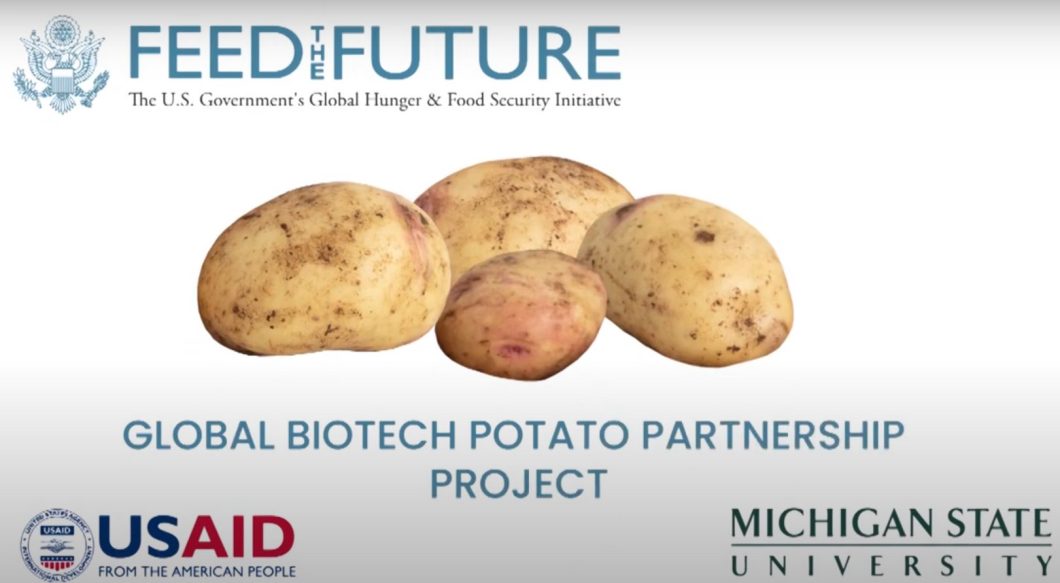This February the “GMO FACTS not FEAR” advocacy team starts a six-month tour of Kenya’s Irish potato planting regions to educate farmers on a late blight resistant (LBR) potato developed through biotechnology. The Late Blight Resistant (LBR) potato is being developed by Kenya Agriculture Livestock Research Organization (KALRO) in collaboration with the International Potato Center (CIP) and Michigan State University. The project, Feed the Future Global Biotech Potato Partnership is funded by the United States Agency for International Development (USAID). As we seek to present facts and educate our farmers’ right from Mt. Elgon to Taita Taveta, it’s important to look back and consider the steps, strides, and leaps taken to get us where we are presently.
The introduction of GMO in Kenya
When the Kenya government adopted the “Biosafety Development Policy” in 2006, it paved the way for the enactment of the Biosafety Act in 2009. This act established the National Biosafety Authority (NBA) which regulates and gives biosafety guidelines in Kenya.
This opened avenues for local research organizations and their international partners to research on several crops to mitigate climate change and fight hunger and malnutrition. It has not been an easy journey, but every huddle pushed on the road to block our dedicated scientist and researchers has inspired them to work even harder.

The Feed the Future Global Biotech Potato Partnership has partnered with several Kenyan and international organization to make research on the biotech potato a great success. Image rights: Feed the Future Global Biotech Potato Partnership
The research and trials on the Biotech LBR potato by KALRO have been going on for over 10 years with promising results that will make a difference to farmers who are currently battling late blight disease.
The following are the advantages of the Biotech potato.
- The Biotech potato can boost potato farmer incomes and food security through reduced use of fungicides because,
- It has extreme resistance to late blight disease without fungicide use.
- Without late blight disease there is increased production per acreage.
- Reduces costs of disease control through less use of fungicides.
2. Extensive testing shows the Biotech potato is as safe as its conventional equivalent.
Scientists have used biotech tools to transfer natural resistance to late blight found in wild relatives of the potato to other farmer-preferred varieties.
The only meaningful difference between this Biotech potato and what many farmers plant in Kenya is that this potato can resist an attack from late blight using genes that are from another potato species.
We anticipate no negative impact on biodiversity and the environment because this new variety is essentially identical to those grown and released by potato breeders for more than 100 years.
3. The Biotech potato has a tremendous impact on smallholder potato farmers in Kenya.
- Kenyans depending on potatoes for their daily food shall have enough for their families.
- Over 2.5 million potato growers shall have enough for sale hence an increase in household income.
- It plays a key role in Kenyan food security and contributes to the alleviation of poverty.
- There will be a reduction in the estimated 30 to 60 percent of the potato crop lost to late blight in Kenya annually.
- According to the African Agricultural Technology Foundation (AATF) the late blight-resistant potato could increase farmer profits by 100,000 Ksh per ha.
- The major beneficiaries will be small-holder farmers growing less than 2 ha of potato.
4. Cultivation of Biotech potatoes contributes to mitigating global warming caused by agriculture.
- Fungicides consume fossil energy to be synthesized, manufactured, transported, and sprayed. The reduction in fungicide uses will reduce fossil energy uses and thus contribute to the fight against climate change. This is because fungicides consume fossil energy while being manufactured, transported and, sprayed.
In the long run, what matters to most Kenyans is for the government to create a conducive environment and adopt suitable and safe technology for farmers to produce and process good nutritious food. Farmers need to produce enough food for their families and have more for sale.
Shortly we shall be taking you across the potato growing zones in Kenya as we interact with various farmers and other stakeholders as we educate them about the new Biotech potato.

